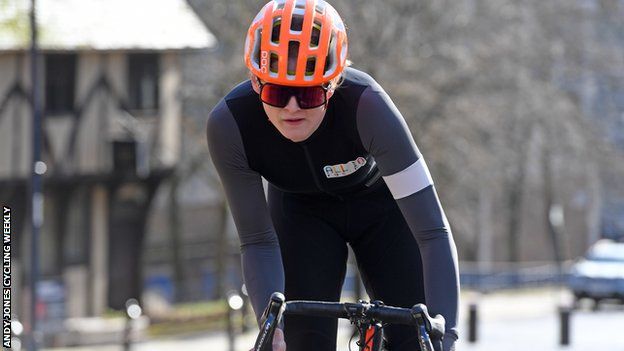Transgender women no longer able to compete at elite female events run by British Cycling
- Published

Emily Bridges previously set a national junior men's record over 25 miles and was selected to join British Cycling's senior academy in 2019
Transgender women are no longer able to compete at elite female events run by British Cycling after the organisation suspended its current policy.
The previous regulations required riders to have had testosterone levels below five nanomoles per litre for a 12-month period prior to competition.
British Cycling says it will conduct a full review of the policy "in the coming weeks".
Last month, Emily Bridges was due to compete in her first elite women's race after meeting the requirements but was later ruled ineligible by cycling's world governing body, the UCI.
A British Cycling statement said transgender and non-binary athletes could still take part in non-competitive activities.
It also said it would speak to "all stakeholders, including women and the transgender and non-binary communities" as part of the review.
"We will also continue to work tirelessly to ensure that our sport remains free of hate, discrimination and abuse in all forms, and that we prioritise the welfare of riders, volunteers, event organisers, commissaires and others that our sport can't continue without," the statement read.
"The challenge is far greater than one event or one sport, and only by working together can we hope to find a timely solution, which achieves fairness in a way that maintains the dignity and respect of all athletes."
Bridges, 21, began hormone therapy last year as part of her gender dysphoria treatment, and raced in men's events until February.
She had been due to compete in her first women's event at the National Omnium Championships.
However, three days beforehand, the UCI told British Cycling that because international ranking points are allocated at national championship events, Bridges' participation could only be allowed once her eligibility to race in international competitions was confirmed. That process is ongoing.
Bridges' mother responded to the decision, external on social media by saying her daughter had been "dumped by email". She added they would make a full statement during the next 24 hours.
The LGBTIQ+ Sport and Physical Activity Alliance, a coalition of national LGBTIQ+ sports organisations, said the decision was "hugely disappointing and will have a detrimental impact on the welcoming and inclusive environment that the governing body had been hoping to create in the sport".
British Cycling said it "understood there are concerns" regarding how its policy reflected the guidance published by the Sports Councils' Equality Group (SCEG) last year.
An 18-month review developed by Sport England, Sport Scotland, Sport Northern Ireland, Sport Wales and UK Sport concluded "testosterone suppression is unlikely to guarantee fairness between transgender women and natal females in gender-affected sports".
It said that "for many sports, the inclusion of transgender people, fairness and safety cannot co-exist in a single competitive model".
That guidance applies to transgender inclusion in non-elite sport.
A group of elite female cyclists wrote a letter to the UCI, calling on it to "rescind" its rules around transgender participation.
UK Sport chief executive Sally Munday said on Thursday she had "huge empathy" for both Bridges, who said she had been "harassed and demonised" over the past week, and her fellow competitors.
Munday added UK Sport was looking to support "everybody who is involved in this discussion".
UK Prime Minister Boris Johnson said earlier this week he did not believe transgender women should compete in female sporting events - a view he conceded might be "controversial".
In response, LGBTQ+ charity Stonewall said: "Trans people deserve the same opportunities as everyone else to enjoy the benefits of sport, and blanket exclusions on trans people participating are fundamentally unfair."
More reading on this subject
'Transgender inclusion, fairness and safety often cannot co-exist' says major review (Sept 2021)
IOC releases new guidance on transgender inclusion (November 2021)
IOC transgender guidance criticised by medical experts (Jan 2022)
Thomas becomes first known transgender athlete to win NCAA swimming title (March 2022)
Lord Coe warns over 'fragile' women's sport (March 2022)
Florida governor DeSantis refuses to recognise Thomas win (March 2022)
Transgender cyclist Bridges set to race in women's National Omnium event (March 2022)
Bridges will not race in women's National Omnium event (March 2022)
Bridges still seeks clarity on 'alleged ineligibility' (March 2022)
UCI can ban Bridges even if she meets eligibility criteria (March 2022)